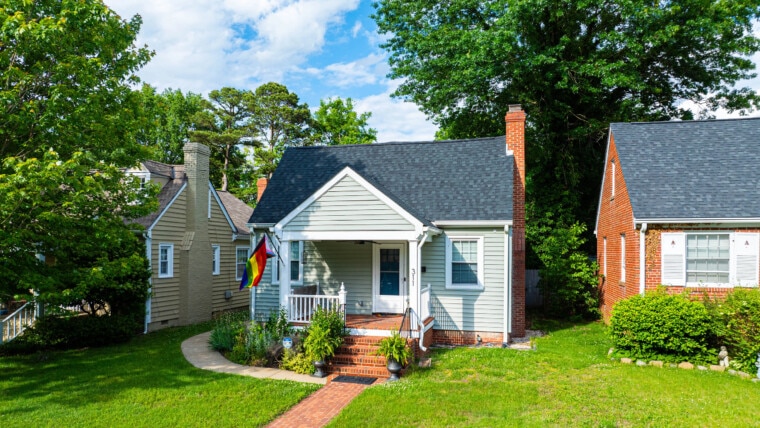If it’s your first time buying a home, you may expect it to be move-in ready on day one. However, not all homes are at their best when the paperwork is signed. If you’re looking at home listings for properties that are being sold “as-is”, there’s a strong chance that they may need repairs or renovations.
What Does It Mean When a House is Sold As-Is?
When a house is sold as-is, it typically means that it is being sold in its current condition. The seller won’t make any improvements, repairs or changes. It’s not uncommon for homes that are sold as-is to need significant renovations or repairs. Frequently, homes that need to be torn down are sold as-is.
Reasons to Purchase a House As-Is
- Low list price: An as-is home is often listed below market value because of its condition. It’s generally safe to assume that the seller and buyer both know that the home will require significant updates or repairs.
- Desirable land or location: Some people buy an as-is home for the land it sits on. This type of sale can be particularly interesting to buyers who want to tear down a house and build their dream home in a specific area.
- Fast sale: In some cases, a seller may want to get rid of their home quickly. As-is sales typically involve less negotiation between the buyer and the seller, leading to a quicker transaction.
- Less competition: Because an as-is home may require significant expenses after purchase, there could be less competition from other buyers who lack the funds to repair, upgrade, tear down or flip an as-is home.
- Extra funds to renovate: Since as-is homes often come with a lower price tag, you may have the funds to update and personalize a property to your exact specifications.
- Investment opportunities: Real estate investors may seek an as-is sale as an opportunity to renovate and flip a home for profit. There’s a similar appeal for investors who want a rental property, since they can control the cost of updates and repairs.
Potential Drawbacks of Buying a House As-Is
- Renovation expenses: A home sold as-is may require costly repairs. This could include addressing concerns like a leaking roof, mold or structural issues. The home’s plumbing, electrical and HVAC systems could also require repair or replacement.
- Possible health hazards: A home that’s in rough condition could have health risks, including pest infestations and the presence of asbestos or lead paint. It’s wise to get the home professionally inspected for these issues prior to purchase and take the necessary precautions when repairs begin.
- Hidden expenses: Even with a home inspection, there could be hidden issues. Corroded pipes, rotten wood or foundation issues could lead to a costlier renovation than expected.
- Inflexible sellers: Sellers of as-is homes often want to avoid negotiation. They are also less likely to accept an offer that gives the buyer an opportunity to cancel the home sale and recover their earnest money deposit. For example, a contingent offer that requires a successful home inspection may be viewed as unfavorable by the seller.
Financing a Home that’s Sold As-Is
There are fewer mortgage options for buyers who want to finance the purchase of an as-is home. This is especially true with Federal Housing Administration (FHA) loans, where the Department of Housing and Urban Development has minimum property requirements that must be met.
Some conventional loans also require a lender-issued home inspection to secure a mortgage. If the results of such an inspection give the lender pause, repairs will need to be made before the sale can move forward.
These conditions may be a barrier for many homebuyers. Still, Michael C. Weiner, a real estate agent with Coldwell Banker Warburg, says that securing a home loan on an as-is property is not more difficult if the buyer is in good financial standing and does not overpay.
“First, a bank has to want to loan a buyer money (thus, strong financials), and then the property needs to be appraised for the purchase price or more for the collateral against the loan,” says Weiner. “Before submitting the offer, a buyer should have a pretty good sense of what the property is worth and what it will cost to make changes – because once the sale is complete, it’s all on the buyer.”
Tips for Buying Real Estate As-Is
“As-is doesn’t necessarily mean that the property has issues,” says David Harris, a real estate agent with Coldwell Banker Warburg. “It means that the seller isn’t making any upgrades or improvements.” Harris offers the following tips for buyers who want to purchase a home that’s sold as-is.
1. Have a Property Inspection
You may already be anticipating expensive repairs when you buy a home as-is, but you should still get it inspected. “While it does incur a cost, spending the money brings peace of mind,” says Harris. “Even if you are okay with performing minor upgrades or if you expect to make improvements, having an inspection can help assess the scope of work to be done as well as inform whether or not larger issues are present.”
2. Ask Lots of Questions
As a buyer, it’s crucial to learn as much as you can about the property. “This is one of the most important financial transactions some will ever make,” says Harris. “Ask when the last time any work was done to the electrical or the roof. Ask if there were ever any leaks or water damage.”
3. See the Property on a Rainy Day
The effects of a rainshower can tell you a lot about potential issues with the home. Harris notes that, “The best time to see if there are any roof issues or leaks in the basement due to foundation or plumbing issues is to see the property when it’s raining.”
4. Review Financials on Investment Properties
“If it’s an investment property that’s currently being rented, ask to see the rent roll and operating expenses,” says Harris. “Find out if the tenants are paying rent on time.” If the property is vacant, your real estate agent should run comps for similar rentals in the area. Harris advises buyers to “See what types of rental properties are in demand in that particular neighborhood.”
Additional Considerations: Buying a House As-Is
The buyer is generally assuming more risk and less opportunity for negotiation when buying a house as-is. Still, a home inspection and the disclosure regulations in your area should provide a clearer picture of the home that you plan to purchase. In some cases, these findings may provide an opportunity to renegotiate the purchase price.
Negotiating an As-Is Purchase
When a home is listed “as-is,” the seller is often less likely to negotiate. However, you don’t want to pay more than the home is worth, especially if you had the house inspected and found major problems. An experienced real estate agent can help you navigate the process, and you can always ask the seller to adjust the purchase price if they refuse to make repairs themselves.
Seller Disclosures Are Almost Always Required
In most states you will be entitled to a Seller’s Disclosure when you purchase a home. This legal document is also known as a property disclosure, and it requires the seller to provide information about the property to the best of their ability. This includes undisclosed details about the home that may give buyers pause, and it helps protect the seller from potential lawsuits after the sale.
The Seller’s Disclosure is typically part of the closing process. The information that it contains will vary depending on the disclosure laws where house is being sold, but most property disclosures typically include:
- Appliances that convey with the sale.
- A checklist of known issues that the seller must confirm, if they exist.
- Questions that the seller must answer about the property.
- The opportunity to provide further information about issues specified in the disclosure.
- The opportunity to disclose information that is not specified in the document.
Consider a Home Warranty
A home warranty will not cover preexisting conditions or known issues when you purchase a home, but it may provide some peace of mind if you’re concerned about unexpected repairs.
In general, buying a home warranty will offer some protection for your home’s fully functional appliances, as well as the plumbing and electrical systems if they are in good working order.
Assemble the Right Team to Buy a Home As-Is
Purchasing a home that requires extensive renovations is a complex process, and you’ll benefit from the expertise of an experienced real estate agent, attorney and contractor. In some instances, you may also need an architect to help you understand the scope of your project.
“Your attorney will be able to search for several potential problems, such as open jobs filed with the city for renovations that were not closed, which can be costly,” says Dan Ragone, real estate agent with Coldwell Banker Warburg. “Invite your contractor and architect to visit the property and get estimates on what it would cost to make the property livable for you and consider this cost in the asking price to make sure you’re getting the best deal.”
In a best-case scenario, Ragone suggests making an all-cash offer or getting a mortgage preapproval in case there are multiple bids on the property.
Should You Buy a House That’s Sold As-Is?
If you have the budget and the vision, an as-is property can be the humble beginnings of your fully renovated dream home. However, it could also be challenging if you’re not prepared for the time and effort that a fixer upper will require.
Be prepared to ask plenty of questions during the buying process, ensure that you have the budget to renovate, and seek out an experienced real estate agent to help you negotiate the deal.
Shelby Sullivan is an experienced content writer with a background reporting on national parks and outdoor destinations. She has written extensively for Homes.com, with a focus on how communities across the United States benefit from their neighborhood parks, trails and lakes. As a native Michigander, Shelby loves writing about neighborhoods where getting outdoors is easy and finding adventure is around every corner. She received her Bachelor of Applied Cultural Anthropology from Grand Valley State University and now spends her time hiking around Richmond, Virginia, with her hound, Sage.












